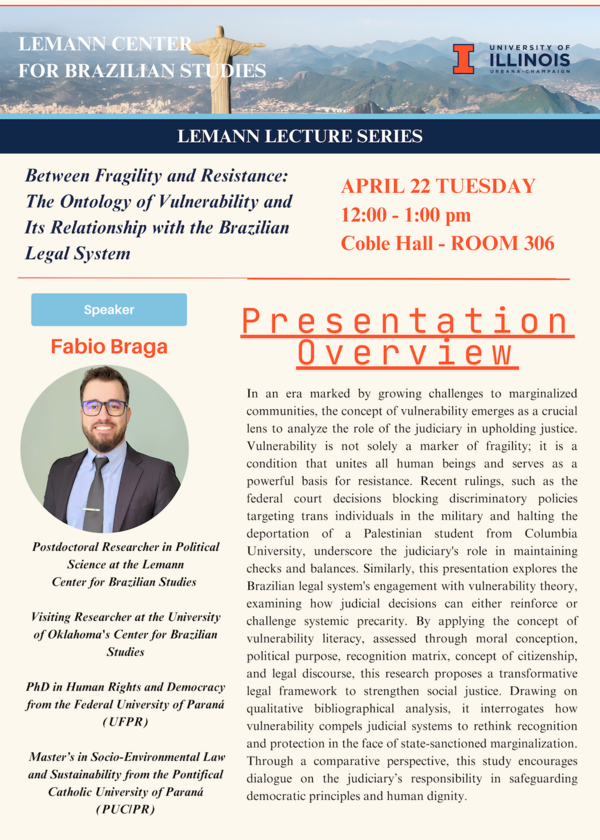
Between Fragility and Resistance: The Ontology of Vulnerability and Its Relationship with the Brazilian Legal System
- Event Type
- Lecture
- Sponsor
- Lemann Center for Brazilian Studies
- Location
- Coble Hall Room 306
- Date
- Apr 22, 2025 12:00 - 1:00 pm
- Views
- 54
- Originating Calendar
- Lemann Center Events
In an era marked by growing challenges to marginalized communities, the concept of vulnerability emerges as a crucial lens to analyze the role of the judiciary in upholding justice. Vulnerability is not solely a marker of fragility; it is a condition that unites all human beings and serves as a powerful basis for resistance. Recent rulings, such as the federal court decisions blocking discriminatory policies targeting trans individuals in the military and halting the deportation of a Palestinian student from Columbia University, underscore the judiciary's role in maintaining checks and balances. Similarly, this presentation explores the Brazilian legal system's engagement with vulnerability theory, examining how judicial decisions can either reinforce or challenge systemic precarity. By applying the concept of vulnerability literacy, assessed through moral conception, political purpose, recognition matrix, concept of citizenship, and legal discourse, this research proposes a transformative legal framework to strengthen social justice. Drawing on qualitative bibliographical analysis, it interrogates how vulnerability compels judicial systems to rethink recognition and protection in the face of state-sanctioned marginalization. Through a comparative perspective, this study encourages dialogue on the judiciary’s responsibility in safeguarding democratic principles and human dignity.
Fábio Rezende Braga is a Postdoctoral Researcher in Political Science at the Lemann Center for Brazilian Studies at the University of Illinois Urbana-Champaign. He is also a Visiting Researcher at the University of Oklahoma's Center for Brazilian Studies. He holds a PhD in Human Rights and Democracy from the Federal University of Paraná (UFPR) and a Master’s in Socio-Environmental Law and Sustainability from the Pontifical Catholic University of Paraná (PUC/PR). His research focuses on Constitutional Law, Social Justice, Gender and Law, Human Rights, and Environmental Law, with an emphasis on vulnerability theory and feminist constitutionalism.